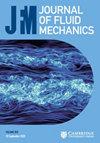窄矩形腔内振荡圆柱体激发的共振驻留面波
IF 3.9
2区 工程技术
Q1 MECHANICS
引用次数: 0
摘要
通过理论和实验研究了在垂直方向上谐振的全浸圆柱体在深窄矩形腔中水面上激发的共振驻波。在势能二维流理论框架下考虑了有限造浪尺寸的影响。考虑了固体表面的非线性和弱耗散。分析了强迫和系统固有频率之间存在失谐时的波的时空结构。实验中研究的表面形状在空间和时间上的变化支持了二维流动的假设。造浪装置的有限尺寸导致空腔有效谐振频率下移;非线性增强了这种效应。对于小振幅波,表面随时间的高程变化被分解为时间周期函数(与强迫频率相对应)及其二次谐波之和;这些分量的波谱形状取决于强迫频率。对于较大的波幅,频谱中会出现额外的峰值。理论预测与实验结果进行了比较。本文章由计算机程序翻译,如有差异,请以英文原文为准。
Resonant standing surface waves excited by an oscillating cylinder in a narrow rectangular cavity
Resonant standing waves excited on the water surface in a deep narrow rectangular cavity by a fully immersed cylinder harmonically oscillating in the vertical direction are studied theoretically and experimentally. The effect of the finite wavemaker size is considered in the framework of the potential two-dimensional flow theory. Nonlinearities and weak dissipation at solid surfaces are accounted for. The spatio-temporal structure of the waves in the presence of detuning between the forcing and the natural frequency of the system is analysed. The variation of the surface shape in space and time studied in experiments supports the assumption of two-dimensional flow. The finite size of the wavemaker causes a downshift of the effective resonant frequency of the cavity; this effect is enhanced by the nonlinearity. For small amplitude waves, the surface elevation evolution in time is decomposed into the sum of the time-periodic function, corresponding to the forcing frequency, and its second harmonic; the shape of the wavenumber spectra of these components depends on the forcing frequency. For larger wave amplitudes, additional peaks in the frequency spectrum appear. The theoretical predictions are compared with the experimental results.
求助全文
通过发布文献求助,成功后即可免费获取论文全文。
去求助
来源期刊
CiteScore
6.50
自引率
27.00%
发文量
945
审稿时长
5.1 months
期刊介绍:
Journal of Fluid Mechanics is the leading international journal in the field and is essential reading for all those concerned with developments in fluid mechanics. It publishes authoritative articles covering theoretical, computational and experimental investigations of all aspects of the mechanics of fluids. Each issue contains papers on both the fundamental aspects of fluid mechanics, and their applications to other fields such as aeronautics, astrophysics, biology, chemical and mechanical engineering, hydraulics, meteorology, oceanography, geology, acoustics and combustion.

 求助内容:
求助内容: 应助结果提醒方式:
应助结果提醒方式:


